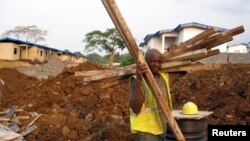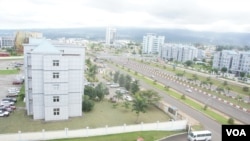MALABO —
Equatorial Guinea. once among the poorest countries in the world, is attracting workers from Africa, Latin America and Europe due to its booming gas and petroleum sector.
The Punto Europa gas plant on Bioko Island in the shadow of the capital, Malabo, was completed seven years ago, about a decade after Equatorial Guinea discovered huge quantities of gas and petroleum reserves.
The plant refines 400,000 barrels per day of crude oil, methanol and liquified natural gas, one of the largest operations of its kind, according to Cameroonian-born gas exploration engineer Essono Jean, who has been working there for four years as production manager. He said it can only be compared with those in America.
Essono is one of the 230 foreigners at the plant, who make up the bulk of the 300 workers.
The discovery of biofuels is transforming this small country of less than a million people into a huge construction site, attracting workers from all over the world.
Mikes Oliveder told VOA that he left his native Brazil to work as a bridge construction engineer in Malabo because there are all kinds of job opportunities.
"They are investing a lot in infrastructure, the roads, the buildings, developing their agriculture, health, so there is a lot of things here, not just the buildings," he explained.
All this investment has raised Equatorial Guinea's gross domestic product (GDP) to the highest in Africa, more than $24,000 per capita, according to the World Bank.
The traditional ruler of Nganmessock, near the port city of Bata, said Equatorial Guinea is witnessing a revolution.
He said until recently, Equatorial Guinea was unknown and now all the investment means water, electricity and more. He says under the president’s plan everyone will have access to basic necessities by 2020.
This revolution is certainly not political. President Teodoro Obiang Nguema has been in power for nearly 35 years, since leading a coup.
And many citizens will tell you that despite what the statistics say, they are not experiencing a revolution in their standard of living.
Nurse Ovam Didier, 34, says despite being trained in Nigeria, he can not get a job in the medical field.
"Most of the 800,000 people here in Equatorial Guinea have very poor standards of living whereas the government is wasting a lot of resources in building roads and other infrastructure. For me they need to take a look, closer look at the basic necessities of the citizens," he said.
According to the World Bank statistics, 76 percent of the Equatorial Guinea's population is poor and 40 percent of rural residents lack water.
Many suspect the riches are ending up in the hands of the elite inner circle. International watchdog groups have long criticized President Obiang for being repressive and leaving his country's people in poverty.
A party leader with the opposition CPDS, Andreas Essono, said the main obstacle is the political system.
He said Equatorial Guinea is a dictatorship and freedom of expression is a serious problem and that even Equatorial Guinea State Radio dedicates almost all of its broadcast time to messages from President Obiang and his PDG party.
In a rare meeting with foreign journalists this past February in Malabo, President Obiang said he knows his international reputation, but that will not stop him from opening the country to foreign investment.
He said Equatorial Guinea is known as a country which disrespects democratic processes, violates human rights and practices corruption. But he said it is intent on leading Equatorial Guinea to be an emerging economy in the next five years.
The Punto Europa gas plant on Bioko Island in the shadow of the capital, Malabo, was completed seven years ago, about a decade after Equatorial Guinea discovered huge quantities of gas and petroleum reserves.
The plant refines 400,000 barrels per day of crude oil, methanol and liquified natural gas, one of the largest operations of its kind, according to Cameroonian-born gas exploration engineer Essono Jean, who has been working there for four years as production manager. He said it can only be compared with those in America.
Essono is one of the 230 foreigners at the plant, who make up the bulk of the 300 workers.
The discovery of biofuels is transforming this small country of less than a million people into a huge construction site, attracting workers from all over the world.
Mikes Oliveder told VOA that he left his native Brazil to work as a bridge construction engineer in Malabo because there are all kinds of job opportunities.
"They are investing a lot in infrastructure, the roads, the buildings, developing their agriculture, health, so there is a lot of things here, not just the buildings," he explained.
All this investment has raised Equatorial Guinea's gross domestic product (GDP) to the highest in Africa, more than $24,000 per capita, according to the World Bank.
The traditional ruler of Nganmessock, near the port city of Bata, said Equatorial Guinea is witnessing a revolution.
He said until recently, Equatorial Guinea was unknown and now all the investment means water, electricity and more. He says under the president’s plan everyone will have access to basic necessities by 2020.
This revolution is certainly not political. President Teodoro Obiang Nguema has been in power for nearly 35 years, since leading a coup.
And many citizens will tell you that despite what the statistics say, they are not experiencing a revolution in their standard of living.
Nurse Ovam Didier, 34, says despite being trained in Nigeria, he can not get a job in the medical field.
"Most of the 800,000 people here in Equatorial Guinea have very poor standards of living whereas the government is wasting a lot of resources in building roads and other infrastructure. For me they need to take a look, closer look at the basic necessities of the citizens," he said.
According to the World Bank statistics, 76 percent of the Equatorial Guinea's population is poor and 40 percent of rural residents lack water.
Many suspect the riches are ending up in the hands of the elite inner circle. International watchdog groups have long criticized President Obiang for being repressive and leaving his country's people in poverty.
A party leader with the opposition CPDS, Andreas Essono, said the main obstacle is the political system.
He said Equatorial Guinea is a dictatorship and freedom of expression is a serious problem and that even Equatorial Guinea State Radio dedicates almost all of its broadcast time to messages from President Obiang and his PDG party.
In a rare meeting with foreign journalists this past February in Malabo, President Obiang said he knows his international reputation, but that will not stop him from opening the country to foreign investment.
He said Equatorial Guinea is known as a country which disrespects democratic processes, violates human rights and practices corruption. But he said it is intent on leading Equatorial Guinea to be an emerging economy in the next five years.





